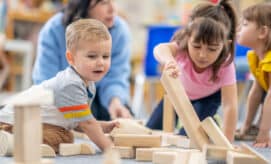The start of a new year is a time for reflection and an opportunity to bring fresh ideas to your early learning program. In this article, we offer a few quick and easy practices to help you maintain your mindful approach to the new year well beyond January 1st. These brief activities are designed to encourage a peaceful classroom environment for the children in your care (and for you!).
Incorporate Brain Breaks
A brain break is a brief activity that offers children an opportunity to relieve any stress they are feeling and reset their mood. You can provide a brain break reset by listening to an uplifting song and encouraging children to dance along, or playing a quick game that invites children to move their bodies.
The following brain breaks are quick, fun, and easy to incorporate into your early learning program routines:
- Take 3 minutes to do some stretches or kid-friendly yoga before nap time each day. This will help get some of the wiggles out of children’s bodies so they can relax and settle down to rest.
- Incorporate a book or song that encourages movement into your morning meeting or circle time routine.
- Sing a silly song with the children in your care to invite shared laughter and joy, and encourage a more positive mood throughout the day.
- Take a quick break to go outside so you can blow bubbles and invite the children to try to catch and pop them. This brief fresh air break invites children to enjoy playful movement and come back inside with renewed energy.
Suggest a Pause when Necessary
Early learning classrooms are high-energy environments in which children can easily get overstimulated. Without realizing it, children can become overwhelmed by the variety of activities, high volume, and large number of bodies in their space.
As the grown-ups in the room, we can observe how the children in our care are doing throughout the day and help them take a moment to pause when they become frustrated or overwhelmed. When you notice that a child might need a break, check in to see how they’re doing and calmly encourage them to take a brief moment to themselves to regroup so that they can return to their peers ready to re-engage.
Practice Your Own Self Care
As educators in busy early learning programs, we can find it difficult to carve out a moment for ourselves. At the same time, we know that pausing to check in with ourselves throughout the day is important, enabling us to show up as our best selves for the little ones in our care.
Taking time for self-care while in the classroom can be as simple as pausing a few times during the day to enjoy a deep in-breath followed by a long exhale. Another option is to have a list of your favorite positive affirmations handy, so you can repeat one of them to yourself during stressful moments.
It can also be helpful to model your self-care practice to children by saying, “I’m feeling a little bit overwhelmed right now. I’m going to pause and take two deep breaths before moving forward.” This helps the little ones in your care learn about self-care and understand that it is an important tool. You might even invite them to join you as you take your deep breaths!





